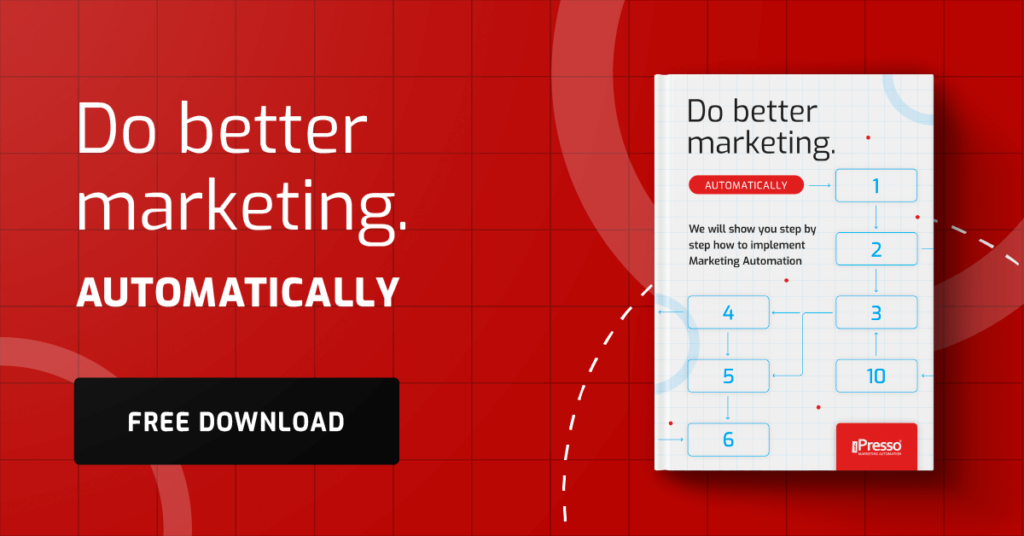Why should you integrate your marketing automation platform with CRM?

Marketing automation is almost never a lonely island – it works with other tools and platforms in your company to create one fully functional sales and marketing ecosystem. CRM is a good example of a tool that should be integrated with marketing automation. Let’s see what benefits such a combination will give to your company.
CRM tools are very helpful when you have at least 100 customers a month and at least one person who’s doing just sales. These tools streamline and enhance the entire sales process because they serve as a central hub that allows you to store and manage customer data.
What’s important is that such tools should not just store customer data but also the entire communication history, previous purchases, and customer service interactions (it’s beneficial to know that a year ago, this particular customer had troubles with one of the features in your platform), as well as the additional details about a given customer (for example, specific information on what version of your product this particular customer has opens doors to upselling).
Why CRMs are so helpful?
The shortest answer is because they enable you to keep tabs on what’s going on with your customers and prospects. At some point, doing all that manually is close to impossible, and you simply need additional automated support. There are at least four crucial features of every good CRM platform:
- Follow-ups
CRM tools give you automated follow-up reminders and indicate parameters you should ask about when talking to a potential customer. This way, the risk that you will forget something or won’t call your customer back is minimized.
- Personalized support
CRMs also help your sales reps to personalize their communication with customers and anticipate their needs. Imagine a sales representative who doesn’t know who he’s talking to and needs to gather information every single time. This would not just be ineffective but also incredibly detrimental from the CX perspective. With a CRM platform, there is no such risk.
- Sales team collaboration
What’s also important is that CRM tools facilitate cooperation between team members, ensuring seamless communication and coordination of new prospects across the sales pipeline (if, for instance, one person does just sales and the other – onboarding).
- Facilitated analytics
Lastly, a good CRM tool comes with analytics and reporting features, enabling you to have a quick look into sales performance. With such input, it’s easier to make informed decisions, test new sales channels, and, ultimately, improve your strategy.
Now, what if you use both a CRM tool and a marketing automation platform? Wouldn’t it be easier to keep those two tools separated? Not necessarily. The combination of CRM and MA gives you access to even more advanced automation that can put more aspects of your everyday work on auto-pilot.
How marketing automation and CRM work together
Imagine a simple scenario: You run a company providing software services for SMEs. You use a CRM system and a marketing automation platform. You’ve just had a potential client who expressed their interest by downloading a whitepaper from your website. You add a new lead to your CRM system. And since your MA platform is also there, it automatically sends a series of emails that contain relevant content related to your offer. The CRM system automatically updates notes about this prospect as the recipient interacts with your content (e.g., clicks and reads your blog posts). A bit later, this prospect fills out a contact form on your website.
The CRM system automatically notifies the sales team that set up the new account for this company, as well as the onboarding call. At the same time, the marketing automation platform supports the process by sending automated reminders and additional resources for this prospect. Once the trial part is done, this company has decided to purchase a fully-fledged product – you’ve just got a new client.
In this simplified scenario, the integration of CRM and marketing automation platforms enables a seamless progression from lead generation to conversion. Both tools “assisted” your client throughout the entire customer journey and facilitated diverse elements of your sales process.
That’s, in short, how marketing automation and CRM platforms can work together to help you give your sales a boost.
Why should you integrate your CRM with the marketing automation platform?
The scenario you’ve just read answers this question – because this way, you can achieve the synergy effect and make the whole process even more automated and effective. But there are also other reasons:
- Better customer understanding: First off, integrating CRM and marketing automation provides you with a more in-depth view of customer data. This better understanding of your customers leads, in turn, to more effective and personalized marketing campaigns. As a result, you can enjoy stronger customer relations.
- Optimized sales funnel: Both CRM and MA assist your customers throughout the entire purchasing process or sales funnel. This gives you the opportunity to optimize different stages of your sales process, eliminate those that aren’t necessary, and strengthen those that work well. As a side benefit, your sales representatives always have up-to-date information, enabling them to tailor their approach and effectively nurture leads through the sales pipeline.
- Increased productivity: As we mentioned before, at some point, handling all that work manually is ineffective, to say the least. With CRM and marketing automation, you can automate many repetitive tasks such as customer data entry, lead scoring, and email campaigns. This not only reduces manual workload but also minimizes the risk of errors, allowing your team to focus on more strategic activities.
- Data-driven decisions: The combination of CRM and marketing automation platforms gives you more data to work with. Use this input to track the effectiveness of your marketing campaigns, monitor sales performance, and identify customer trends. This will make your marketing campaigns even more effective and the decisions you make – more accurate.
Integrate your CRM with iPresso
If you’re still looking for both tools, we invite you to have a look at Pipedrive. It’s one of the best sales management tools out there. Pipedrive enables you to manage your sales pipeline, and it comes with a user-friendly visual interface. At iPresso, we offer streamlined integration with Pipedrive, thus helping you make the most of both CRM and marketing automation.
Of course, iPresso can be integrated with more tools than just Pipedrive. When it comes to CRM platforms, you can choose Base, Contactually, Livespace, Copper, Salesforce, and SugarCRM. If you use a different tool, ask us about it; perhaps we’ll be able to help you with the integration. Read more about our integrations.
We encourage you to give this combination a shot. You will enjoy an automated sales process that takes all the important details and data sources into account to help you make the most of every prospect. You can start using our platform with a free trial to see how we can help you. Just send this short form to our team!



